Navigation
Install the app
How to install the app on iOS
Follow along with the video below to see how to install our site as a web app on your home screen.

Note: This feature currently requires accessing the site using the built-in Safari browser.
More options
You are using an out of date browser. It may not display this or other websites correctly.
You should upgrade or use an alternative browser.
You should upgrade or use an alternative browser.
Users who are viewing this thread
Total: 2 (members: 0, guests: 2)
He got exactly what was coming to him. No sympathy.
What was missing was a car mounting the sidewalk to run him over.
maybe next time.
What was missing was a car mounting the sidewalk to run him over.
maybe next time.
Looks like he got a broken arm at the least😂😂 well deserved👍 the guard appears to have done that before😂👍
Deserved, yes,. that is not how it ends though. The guard will rightfully be fired and the company that employed him drastically sued.
Skateboarding is not a crime but trespassing and assault are. Nobody is truly right here.
wiggins
Forum Veteran
Yeah, fuck 'em...He got exactly what was coming to him. No sympathy.
What was missing was a car mounting the sidewalk to run him over.
maybe next time.
A better ending would be for the guard to go down, assess his arm, and then put him down with a shot from his pistole...
wiggins
Forum Veteran
Yes. Nothing is too much for these Andy Tiffa cuntsthe guard should have released the dogs on him while he was writhing in pain
Black skateboarders on the life and death of Tyre Nichols: ‘He was one of us. That could have been me’
Three skaters address their own experiences, activism and the police response to their communitiesNiloufar Haidari
It has been nearly a month since Tyre Nichols died after a beating by Memphis police. Even by the standards of a country with a long legacy of police violence, his death was breathtaking in its brutality – both in the severity of the beating by the police officers, and the negligence shown by the EMTs who stood around for 19 minutes while he fought for his life on the ground.
Nichols, 29, was a lot of things: a father, photographer, lover of sunsets and a skater. Due to its public image as a nuisance to polite society, skateboarding is a hobby intimately familiar with skirmishes with law enforcement; for Black skaters, who are often seen as outsiders in a world of outsiders, these interactions can be particularly fraught.

Dimitri Crippen rides his skateboard as a group of people protest over Tyre Nichols’s death at the Old Fourth Ward Skatepark in Atlanta last month. Photograph: Erik S Lesser/EPA
Since the news broke, the skateboarding community has come together to condemn the death and spread a joyful video of Tyre doing what he loved – skating. Celebrated Black skaters such as Stevie Williams have spoken outabout the killing on social media, and this weekend saw skaters take to the streets from Memphis to Los Angeles to Keep Pushing for Tyre in remembrance.
‘I felt this deep, personal grief’: Patrick Kigongo
Acting executive board chair for the Harold Hunter Foundation and co-host of the Mostly Skateboarding podcastThat could have been me. It’s a recurring thought for any Black person in America when there’s a Black person killed by police officers, but this one really hit close to home. We often talk about the way that Black people are portrayed in media, and the clip that has been circulating of him skating has been refreshing because it’s something so joyous, this stark contrast to the footage of him being beaten by cops. When I saw that video I felt this deep, personal grief, something I didn’t anticipate.
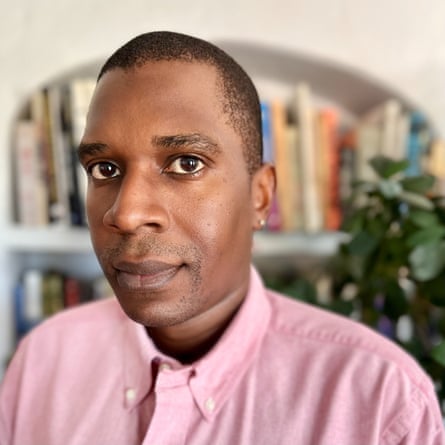
Patrick Kigongo. Photograph: Courtesy Patrick Kigongo
Skateboarding is not a monolith, but something that every skateboarder has experienced is some sort of frightening or traumatizing experience dealing with either police officers or security guards. I remember the first time I got lined up with a bunch of my friends for skating at a loading dock behind a photo studio. There was something bizarre about it, in that we all knew what to do – you sit on your hands, you don’t say anything, nobody talks out of turn, and ideally, they let you go. I’ve had friends who have been slammed into police cars, friends who have been arrested and detained – I’ve certainly been handcuffed, I’ve been stopped and frisked.
I think there has been an increased political awareness in the wider skate community since the George Floyd protests, but certain scenes have always had a political bent. The difference now is that although the industry might still be mostly white, the ridership has diversified significantly. The skateboarder Na-Kel Smith went on Instagram Live around the time of the Floyd protests to talk about microaggressions and racism that he’s experienced in the van [on tour], and it awakened something – I really have to give credit to that conversation to get more people talking about race and identity within skateboarding.
A lot of skaters are putting together memorials for Tyre Nichols, digging into the fact that he was one of us. Skateboarders are very good at commemorating skaters’ lives, but that’s not enough, because it’s not going to bring Tyre back, and it’s not going to answer the fundamental question of what needs to be done. We showed up in 2020 in a lot of different ways, and the reaction, the pushback, was so big and so violent that it’s difficult to think about the idea of mobilizing in those numbers again. It feels as though we continue to expend so much energy, organizing, reacting, making posts, and we still can’t seem to create foundational changes to American federal or state laws that will protect Black people – and all Americans – from these kinds of violent or deadly encounters with the police.
‘The beauty of skateboarding is you become allies with anyone who’s on a skateboard’: Aaron Wiggs
Supreme NYC employee and community organizerWhen I look at Tyre, I look at him as a Black man first and a skateboarder second. As a Black person in America, you grow to be a little numb – there’s the grief that you have for these victims, and also the not knowing if you’re going to be the next casualty while going about your day-to-day.
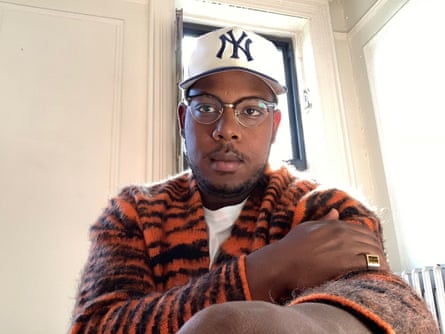
Aaron Wiggs. Photograph: Courtesy Aaron Wiggs
I’ve had run-ins with the cops and been in situations where I’ve been scared shitless – both on and off the skateboard. They will go to extremes to instill fear and let you know that they are the law. Even just driving while being Black – I’ve been pulled over for that, so you can imagine [what it’s like] when we’re skating and destroying property. There was a time we were skating a spot at a school and a cop came and called three cop cars, came walking out with hands on the gun – it’s so unnecessary, just tell us to leave.
I’m originally from California. My family moved further inland because of the aftermath of the LA riots, and that’s how I got into skating – having white friends. They turned me on to it, but then you discover there are Black skateboarders. Back then there wasn’t a lot of us, and we stuck out like a sore thumb. I definitely experienced racism within the [skate] community that I was trying to be a part of, and the Black community at the time was so detached from it, they just viewed you as wanting to be white. You’re left in the middle questioning your identity: what is it about me doing something that I really want to do, and the way I express myself, that makes people treat me this way?
The beauty of skateboarding is you become allies with anyone who’s on a skateboard – you can go anywhere in the world and meet someone with a skateboard and you become friends. Your sense of community is stronger. As a skateboarder you’re already in the streets, so putting that energy out there in the form of protest during the BLM movement was something natural for skateboarders.

A Tyre Nichols memorial at The Embrace sculpture on Boston Common. Photograph: MediaPunch/Rex/Shutterstock
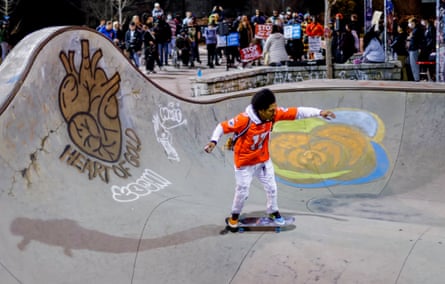
A skateboarder at the protest on behalf of Tyre Nichols in Atlanta. Photograph: Erik S Lesser/EPA
Going forward, I think the United States needs to be a lot more selective about who becomes a cop. If you understand the history of policing in the United States, it’s built from racism, from slave catchers who turned into the police force. It would be amazing if guns weren’t a thing, if police training was more tactical [so] they’re not trained to kill. This is something that my grandfather was petrified of when he was my age, and it still exists. It’s exhausting.
‘If you’re an adult Black skateboarder, you are seen as a problem’: Josh Adams
Memphis skater and activist with Decarcerate Memphis and the Official BLM Memphis Chapter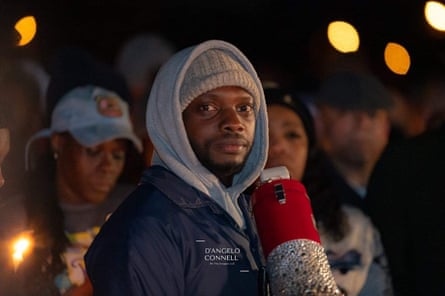
Josh Adams. Photograph: Courtesy Josh Adams
As a Memphis skateboarder, the anger is that I could have met Tyre Nichols through skating, but that’s not a possibility now. As an activist, it angered me because on December 6, Decarcerate Memphis presented data to the city council about the dangers of these traffic stops. The police here have used messaging that couples reckless driving with violent crime – in [Tennessee], there are a lot of traffic maneuvers that can be deemed “reckless driving”, even just running a stop sign. Once you’ve linked these two things together, the police now have probable cause, and you’ve created a perfect situation for police to treat people with utter disregard for their life over a simple traffic stop, which was what led to Tyre Nichols’s death.
Black people deal with inequities around policing no matter what they’re doing and where they are. When I was younger, the police might see me skateboarding and say things like, “Oh, well, at least you’re not doing anything bad like the other [Black] kids are doing.” But as I got older, they see me and immediately jump to the assumption of drug use. If you’re an adult Black skateboarder – especially if you have facial hair and tattoos – you are seen as a problem. I was pulled over in 2013 and the officer saw a skateboard in the back of the car and said, “It seems like you’re on your way to the skate park,” which he [seemed to] associate with drug possession, and asked us to step out of the car, patted us down, asked if he could search the car, and then tried to call for a canine unit when I refused.
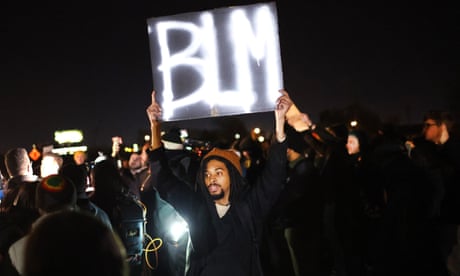
Patrisse Cullors on 10 years of Black Lives Matter: ‘A painful reminder of what hasn’t changed’
Read more
The whitewashing of skateboarding by the mainstream media leads to a false ostracization that happens when you start skateboarding – people think that you’re not into Black culture, or that you might not be from a certain type of background. Most of the skaters I skate with are Black people from a working-class background who have been through the justice system. The only thing people know about skateboarding here is major competitions like the X Games, so we don’t see skaters like Antwuan Dixon, Terry Kennedy, Tyshawn Jones – he’s won skater of the year twice, but a lot of people don’t even know his name.
One thing that I hope we do is begin to reduce police funding – we don’t need armed patrolmen to help us have safe traffic. The police need to be defunded, social programs need to be invested in, and we need to pass policy to make sure that the police are held accountable for any criminal activity they engage in.
Why are fat rent-a-cops always the biggest faggots
Similar threads
- Replies
- 3
- Views
- 309
- Replies
- 6
- Views
- 582

